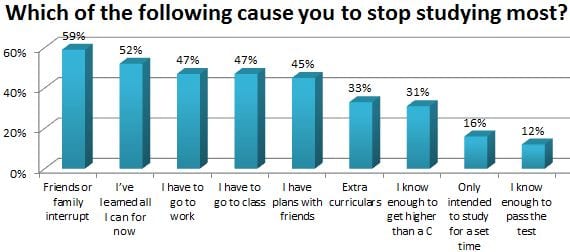Why has my student stopped their studies out of the blue? When you are new to teaching it can feel like a bit of a punch to the gut. Self-doubt settles in. Is it me? Or is it the student? Have I done something wrong? What can I do differently next time?
Take a deep breath, there is nothing to worry about. Students dropping out is actually a normal occurrence and in most cases, it’s not you. Every student is unique and has a unique circumstance, we need to remember this. I always say, put yourself in the students’ shoes. Could it be because of financial difficulty? Is their schedule just too busy? Do frequent business trips get in the way and they lose motivation? Is your student a child/teenager? Are the parents aware of the challenges?
In today’s article, we will explore the different reasons as to why students stop their studies and what teachers can do to prevent such situations.
Why do students stop studying?
1) According to a case study, some students drop out of learning for a very simple reason which shouldn’t surprise us — distractions.

Students stop studying because of too many distractions. Distractions which are far more appealing such as socializing. We live in the digitalized 21st century, distractions are everywhere. You don’t need friends physically popping in to visit. Now we have smartphones and most of the world seems to be addicted to them.
We also have to consider technology and the role it plays. This smart technology allows us to multitask which results in humans being lazier than ever. Gone are the days where we had to flip through a book or visit the library to study or find information. Now it’s all available at a click of a button. We are overstimulated by the digital world and now, as a result, we get bored very quickly. This means your lessons need to be super engaging and stimulating. We are competing with the digital world, unfortunately.
Sometimes students have personal and professional commitments clashing with the study time.
Many students are parents themselves and if you are a parent, you know how unpredictable your schedule can be.
What should a teacher do?
— Keep the student on track and if they get distracted frequently or easily, always take control back and draw the students attention to the material or topic.
— Teach time-management.
— In the second situation, we can’t hold this against our students. Instead, offer flexibility to the student and follow up regularly. Remember Students = Value.
2) Failing or having low scores.
Your student might be achieving low scores during their homework sessions or practice at home resulting in the feeling of hopelessness. Low scores or results can lead to feelings of stress and anxiety and as a result, the student feels demotivated and drops out.
What should a teacher do?
— It’s important that you discuss homework and the struggles with your student. Check their results and have an open discussion. This again creates value and self-improvement.
— Take the lessons slower, spend more time on a section. Add additional material to support the lesson instead of trying to finish as much as you can in a session.
— Make sure the student understands and grasps the concept and send specific homework tasks so that the student is not overwhelmed and can focus on one thing at a time.
3) Boredom or not personalized approach.
Our students can drop out if they feel their time is wasted by learning courses or materials that are not within their goals or not of interest. Also keep in mind when a teacher takes on too many students (high student: teacher ratio) it would be nearly impossible to deliver quality personalized lessons.
What should a teacher do?
— A student will feel motivated when the course is specific to their needs and delivered in high quality and personalized manner. This method will encourage the student to book more lessons rather than have 1 lesson a week. For results to be achieved and be seen, one lesson a week will not be enough so it’s up to you to make sure you analyze the students’ goals and needs accurately.
— Students want to see results and we as online teachers need to constantly think outside the box and creatively on how we will show them these results. Remember to revise goals and use different types of materials to keep the student engaged, challenged and motivated.
What about online students?
The Department of Human Resource Education University of Illinois at Urbana-Champaign did a fantastic case study on “Factors that Influence Students’ Decision to Dropout of Online Courses” and their findings were the following.
Personal Reasons:
- Financial difficulties or the long-term financial investment not worth the benefit.
- Lack of time to complete the assignments, which took more time compared to traditional courses.
- Schedule conflicts.
- Family problems.
Job-related Reasons:
- Job responsibilities changed during the program.
- Their company didn’t support the program.
- Too hard to work full-time and be a student in an online course.
Program-related Reasons:
- Too many low-level assignments.
- Too difficult working on the group assignments.
- Lack of one-to-one interaction with the instructors and students;
- The academic program was too difficult/demanding;
- Lack of interest in the material or the program didn’t meet expectations.
Technology-related Reasons:
- The learning environment was too de-personalized.
- Not enough support from the technical staff.
- The technology overwhelmed the content;
- Lack of technical preparation for the program.
What can you do as a teacher?
- Relationship, relationship, relationship. An important aspect is the relationship you build with your student. Your learning environment should feel safe, stress-free. It’s important that the student should always feel valued. I like to think of my English classes as the silver lining in my students’ day. If our students do not feel valued, why should they commit their little or valuable time? Why would they bother?
- When a student skips lessons, what do you do? Do you just leave it and let it be?
Get on to telegram, skype, email. Goodness, you can even phone and check in on them. Let the student feel appreciated by showing empathy instead of anger or frustration.A simple: “Hey, we missed you! How are things? Is your schedule very busy? How can I help you manage so that you do not fall behind on your English learning?” is a lot more effective than not doing anything at all. If left unaddressed or when empathy is not shown the student will absolutely not return. Why should the students care if we don’t?
As for kids:
Parents are busy too. In most cases, parents are not aware of issues or challenges their children might be experiencing during their English lessons. Not all parents sit in on their children’s lessons thus resulting in the parents being completely oblivious. The child might not have the language ability to express that they do not understand.
In this situation, work with the parents or the students’ manager by giving regular feedback. Remember to not only focus on the negative but the positive too. Too much negative feedback will result in demotivation and of course, the student again won’t feel valued. Work together as a team to support the student and their growth.
To wrap up, yes teachers definitely play a small role in student retention versus student drop out but in many cases, we can be the best teachers we can be but unfortunately we can not control the students’ personal time and finances.






 Вероника Аветисян
Вероника Аветисян 
 Маргарита Аветисян
Маргарита Аветисян 


